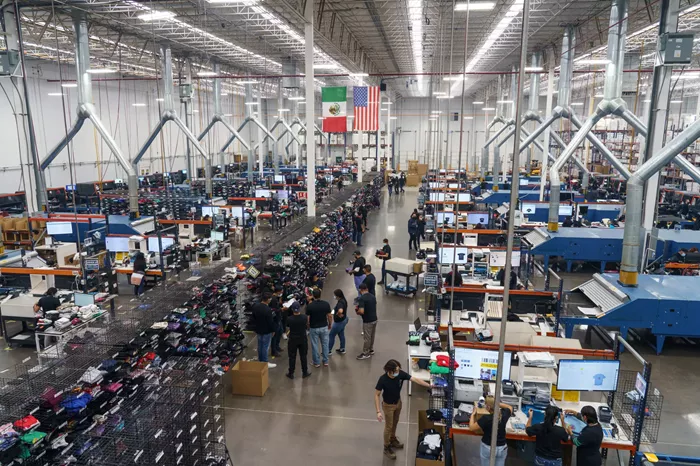Economists are raising alarms about the potential consequences of former President Donald Trump’s plan to impose tariffs on Mexican goods. They caution that even a small increase in tariffs could lead to higher unemployment, increased poverty, and more migration from Mexico to the United States.
Trump has promised to implement a broad tax of 10% or 20% on all imports to the U.S. Additionally, he has threatened to impose steep taxes on automobiles coming from Mexico, stating, “I’ll put 200% or 500%, I don’t care.”
MEXICO CITY — If Trump is reelected and follows through with his tariff plans, experts suggest it could disrupt the global economy, particularly affecting Mexico. The Mexican economy relies heavily on trade, with 83% of its exports going to the U.S.
Mexicans are closely watching the upcoming U.S. election, concerned that Trump could defeat Democratic nominee Vice President Kamala Harris. Recently, the Mexican peso fell in value as polls indicated Trump was gaining traction in key swing states.
Experts warn that even a minor increase in tariffs could cause significant economic issues for Mexico, leading to increased unemployment and poverty. Some predict this could push more people to migrate to the U.S.
“Even the threat of tariffs will create havoc,” said Juan Carlos Moreno-Brid, an economics professor at the National Autonomous University of Mexico. “It will further reduce Mexico’s long-term economic growth and could drive migration to the United States and Canada.”
Tight Economic Ties
The economic relationship between the U.S. and Mexico is one of the closest in the world. In 2023, U.S. exports to Mexico reached $367 billion, while imports exceeded $529 billion. Mexico has been the largest trading partner of the U.S. since 2021, surpassing China.
Trump has frequently criticized the loss of manufacturing jobs to countries like Mexico and China, claiming that tariffs could bring factories back to the U.S. However, many economists are skeptical of this claim. Evidence suggests that higher tariffs during his presidency may have cost American jobs.
Economists predict that a 20% tariff could cost the average U.S. family about $2,600 annually. Harris estimates the figure could rise to nearly $4,000, calling it a “Trump sales tax.”
It is unclear what impact Trump’s fluctuating tariff proposals will have on the U.S. and global economy. He has stated plans for various tariffs, including 60% on Chinese imports.
In a recent Fox News interview, Trump threatened steep taxes on Mexican cars, a significant part of U.S.-Mexico trade, where cars and auto parts are frequently transported across the border for production.
Potential for Global Trade Wars
New tariffs could spark global trade wars, as other countries may retaliate with their own taxes on U.S. imports, particularly targeting U.S. farm goods. The International Monetary Fund has warned that global growth may slow as a result.
Countries like Mexico, which depend on exports for growth, would feel the most significant impact. According to World Bank data, Mexico’s exports and imports account for nearly 90% of its GDP. Economists caution that even small tariff increases could seriously threaten Mexico’s economy.
A recent report from Moody’s Analytics predicts that under a worst-case scenario, the Mexican economy could slip into recession, leading to currency depreciation and rising inflation. The mere threat of tariffs has already deterred foreign investment in Mexico, as seen with Tesla pausing its plans to build a factory in the country due to Trump’s proposed taxes on auto imports.
Trump has also threatened to target specific companies, recently mentioning 200% tariffs on John Deere if the company moves jobs to Mexico.
“The threat of tariffs and Trump’s unpredictable approach do not provide any investment certainty,” said Rodrigo Aguilera, an independent economist.
Historical Context and Current Concerns
During his presidency, Trump imposed tariffs on steel imports from Mexico and other countries, resulting in retaliatory tariffs on American agricultural goods and straining U.S.-Mexico relations. While he previously threatened broad tariffs on Mexican goods, he backed off after business leaders expressed concerns about the negative impact.
Some Mexican officials doubt that Trump will carry out his tariff threats, viewing them as campaign tactics. Marcelo Ebrard, Mexico’s economy secretary, stated, “The United States economy is not a manufacturing economy,” suggesting that tariffs could be counterproductive.
However, some analysts worry that Trump might adopt more extreme measures if he returns to office. Pamela K. Starr, a professor at USC, commented, “Trump is not going to be moderated by more moderate conservatives. The second presidency will likely see Trump unleashed.”
Economist Rodrigo Aguilera emphasized that Trump would likely use tariffs as leverage to compel Mexico to cooperate on issues like migration and security policies.
If Trump implements tariffs on Mexico, it would violate the U.S.-Mexico-Canada Agreement (USMCA), a trade treaty established in 2020, which aims to eliminate tariffs on North American trade. If the U.S. violates this agreement, Mexico could respond with its own retaliatory measures.
When Trump and former President Andrés Manuel López Obrador were in office, their relationship was marked by an unexpected calm. López Obrador often referred to Trump as “a friend,” noting a foundation of mutual respect. However, this dynamic may change under Mexico’s new president, Claudia Sheinbaum, especially given Trump’s past difficulties in working with female leaders.
Sheinbaum has largely refrained from making strong comments about Trump’s tariff threats, only stating that both countries would suffer if tariffs are enacted. She noted that free trade is vital for both the U.S. and Mexico.
Taking office amid economic challenges, Sheinbaum faces a significant budget deficit, the largest since the 1980s. Despite efforts to alleviate poverty, 36% of Mexicans still live in poverty, with 7% experiencing extreme poverty.
Political developments in Mexico, including proposed judicial reforms, have unsettled some investors. Critics argue that these reforms may undermine judicial independence, raising concerns about the economic outlook.
In Mexico and much of Latin America, poverty often correlates with immigration patterns. A severe recession in the 1990s resulted in approximately 5 million Mexicans migrating to the U.S.
Related topics:


